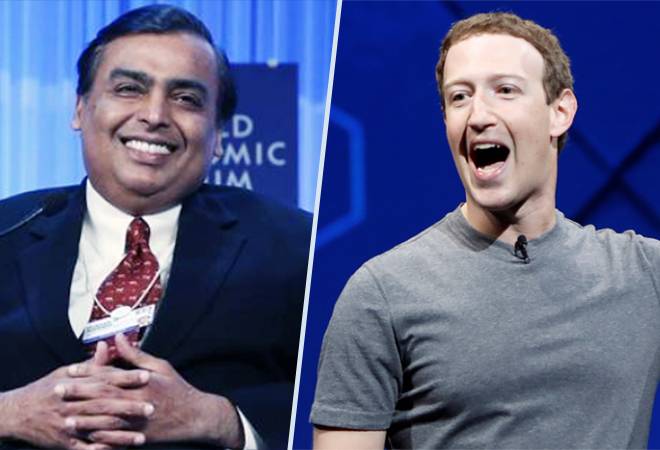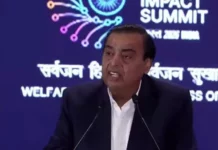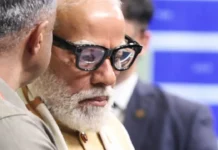NEW DELHI: It was coming but no one thought it to be this big, especially during the grim COVID-19 times. Facebook’s $5.7 billion investment (approx. Rs 43,574 crore) in Reliance Jio has created ripples in the Indian tech and ecommerce sector, leaving the leading players guessing what is coming next.
After announcing the social networking giant’s biggest overseas investment to date, Facebook CEO Mark Zuckerberg said it will open up commerce opportunities for people across India.
The biggest beneficiary of the deal is going to be JioMart � Reliance Retail’s new commerce business that will deliver groceries and other household essentials. The investment is strategic at a point of time when everyone out there, be it Amazon or Flipkart, are only delivering groceries and other essential items in the social distancing times.
Reliance Retail’s entry into the online retail sector is the biggest challenge for Amazon as the Mukesh Ambani-led behemoth is well positioned to create massive disruption in the market.
Reliance Retail operates 10,415 stores in more than 6,600 cities and towns, with 500 million annual footfalls – giving the company the kind of scale required to swiftly launch India-based operations.
The other big beneficiary is WhatsApp Pay. Despite a delay in launching WhatsApp pay in India owing to data compliance issues, Zuckerberg has repeatedly said that the peer-to-peer, UPI-based payments feature is the next big thing for the country.
Data compliance issues and regulations have kept WhatsApp Pay launch in abeyance for quite some time, despite a successful test run of the payments service with one million users in the country in 2018.
The peer-to-peer, UPI-based WhatsApp Pay service will reach over 400 million users — especially the small and medium businesses (SMBs) — to boost digital inclusion in the country.
Concurrently to the investment, Jio Platforms, Reliance Retail and WhatsApp have also entered into a commercial partnership agreement to further accelerate Reliance Retail’s New Commerce business on the JioMart platform using WhatsApp and to support small businesses on WhatsApp.
A Bernstein report said last month that the “greatest growth opportunity” in the country lies in the organised retail segment.
“We expect India’s retail market, which is currently 90 per cent unorganized and ready for digital disruption, to reach $1.2 trillion by 2025. Reliance is the offline leader with $18.5 billion in revenues and 11,000+ stores,” said the report.
“The company is best positioned in New Commerce, digitizing neighborhood stores, and e-commerce apps (JioMart and AJIO). Beyond retail, we see opportunities in fintech and media, where there are clear opportunities for synergies with telecom,” it added.
According to Prabhu Ram, Head-Industry Intelligence Group (IIG), CMR, what Jio has achieved over a short span of time is to build an unenviable technology stack, cutting across payments, retail, entertainment, AI-led education, among others, put together through a string of acquisitions.
“Jio has all the core ingredients for a �super platform’, including, most importantly, a closed network of 388 million subscribers,” Ram told IANS.
As a digital economy, India offers plenty of headroom for growth.
“The collaboration with Facebook will enable Jio to competitively stay ahead of the curve, and grab a large consumer wallet share across domains. Facebook’s WhatsApp is a key trump card in realizing this goal,” he noted.
Beyond WhatsApp Payments, Facebook is also working on several other efforts to help facilitate more commerce from Facebook Marketplace to Instagram Shopping and its work on Facebook Pay or the digital currency Libra.
“From Facebook’s perspective, India has always been high on its radar. Its past attempts, including Free Basics, have failed here. The Jio deal provides it with a stronger foothold to break through in India,” Ram noted.
Shrenik Gandhi, Chief Executive Officer and Co-Founder, White Rivers Media, said that this investment not only has monetary benefits for both organisations, but also has economic benefit for the nation.
“This deal will empower digital transformation of millions which shall boost not only the digital ecosystem but also the nation. The next 100 million Internet users will be easier to get on board thanks to this deal,” Gandhi said in a statement.
Morgan Stanley as financial advisor and AZB & Partners and Davis Polk & Wardwell as counsels advised on the Facebook-Jio transaction.
According to Zuckerberg, India is home to the largest communities on Facebook and WhatsApp, and a lot of talented entrepreneurs.
“The country is in the middle of a major digital transformation and organizations like Jio have played a big part in getting hundreds of millions of Indian people and small businesses online,” he said.
India has more than 60 million small businesses and millions of people rely on them for jobs.
“With communities around the world in lockdown, many of these entrepreneurs need digital tools they can rely on to find and communicate with customers and grow their businesses. This is something we can help with — and that’s why we’re partnering with Jio to help people and businesses in India create new opportunities,” the Facebook CEO emphasized.







